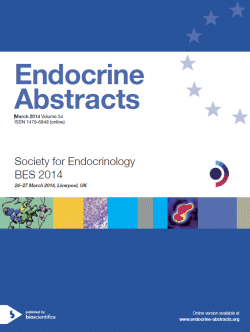Oral Communications
Endocrine regulation of cell behaviour
ea0034oc2.1 | Endocrine regulation of cell behaviour | SFEBES2014
A novel modulator of cell invasion and metastasis
Watkins Rachel , Smith Vicki , Sharna Neil , Read Martin , Kwan Perkin , Fletcher Rachel , Boelaert Kristien , Franklyn Jayne , McCabe Chris
ea0034oc2.2 | Endocrine regulation of cell behaviour | SFEBES2014
Inhibition of human NET cell proliferation by a peptide identified through phage display screening
Stevenson Mark , Lines Kate , Zalmas Lykourgos-Panagiotis , Javid Mahsa , Galvanovskis Juris , Grozinsky-Glasberg Simona , Wood Matthew , Grossman Ashley , Thakker Rajesh
ea0034oc2.3 | Endocrine regulation of cell behaviour | SFEBES2014
A20 confers protection against TRAIL-induced apoptosis in the pancreatic β-cell
Yates Rebecca , Robinson Jonathan , Al-Azzawi Buthainah , Kelly Catriona
ea0034oc2.4 | Endocrine regulation of cell behaviour | SFEBES2014
Influence of glucocorticoid receptor density on development and remodeling of the heart
Richardson Rachel , Rog-Zielinska Eva , Thomson Adrian , Moran Carmel , Gray Gillian , Chapman Karen
ea0034oc2.5 | Endocrine regulation of cell behaviour | SFEBES2014
β-cells require CFTR for glucose-induced insulin secretion
Robinson Jonathan , Yates Rebecca , Harper Alan , Kelly Catriona
ea0034oc2.6 | Endocrine regulation of cell behaviour | SFEBES2014
A potential role for food-derived microRNAs in human placental development
Timms Kate , Westwood Melissa , Forbes Karen




